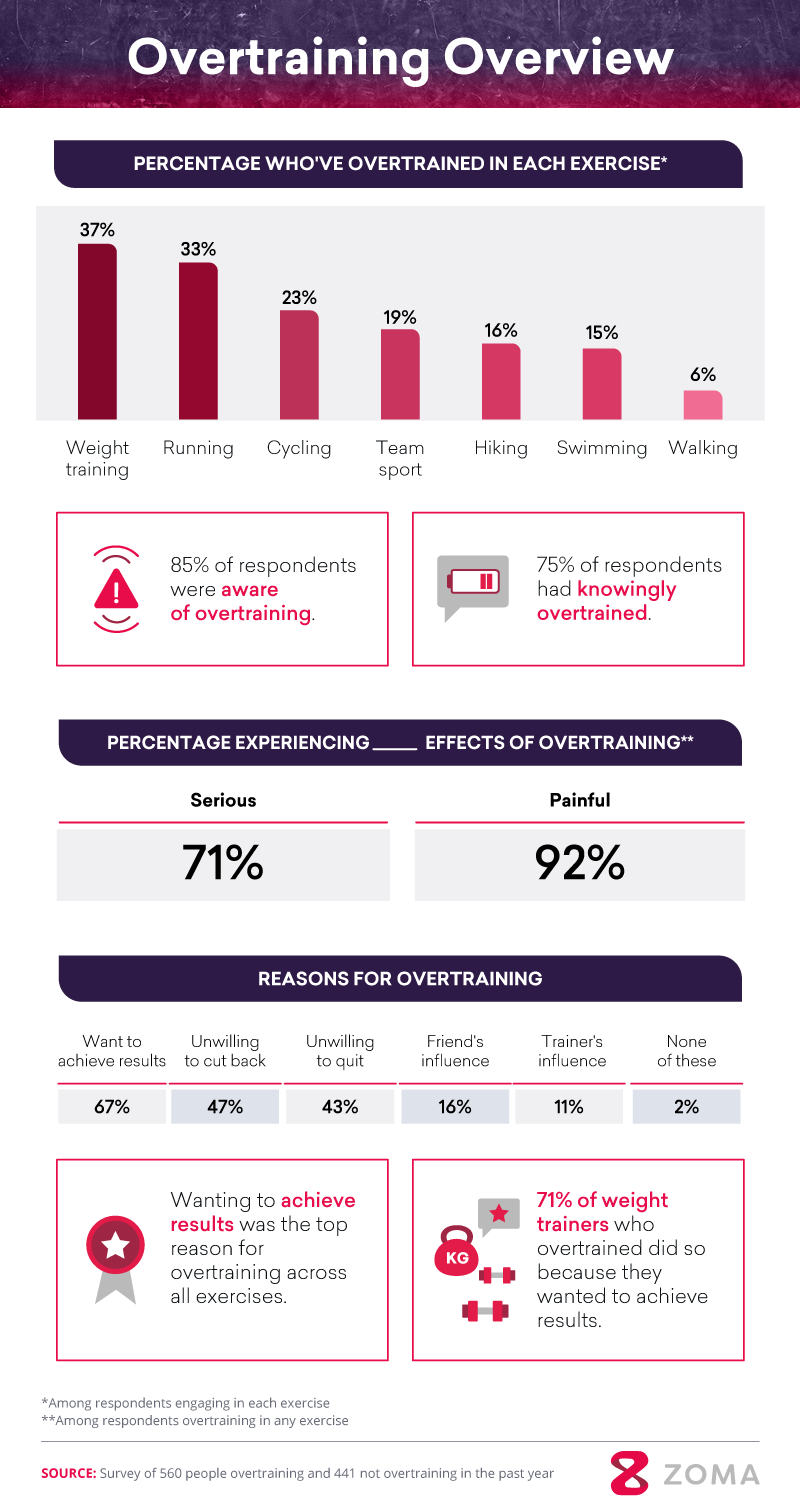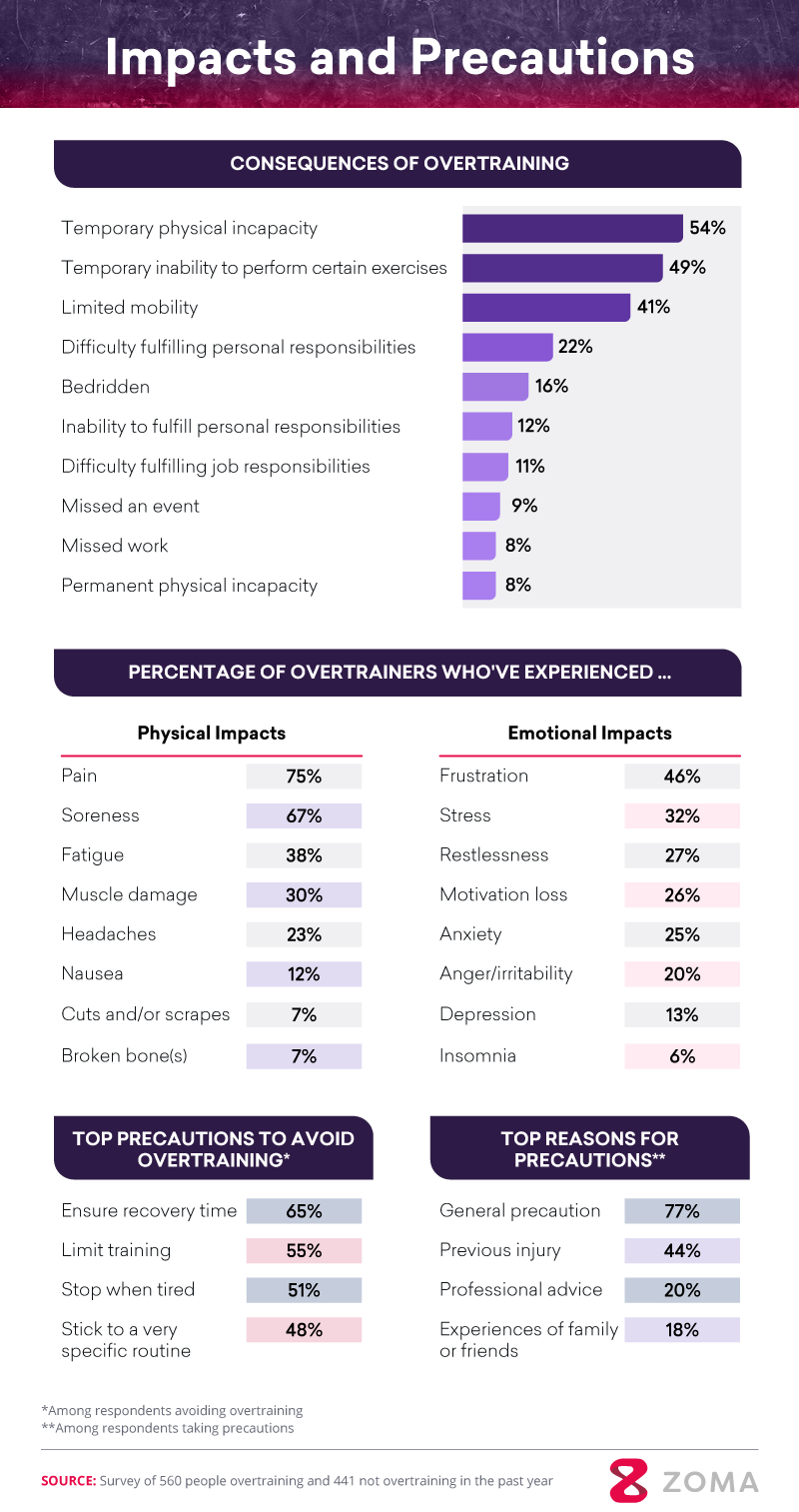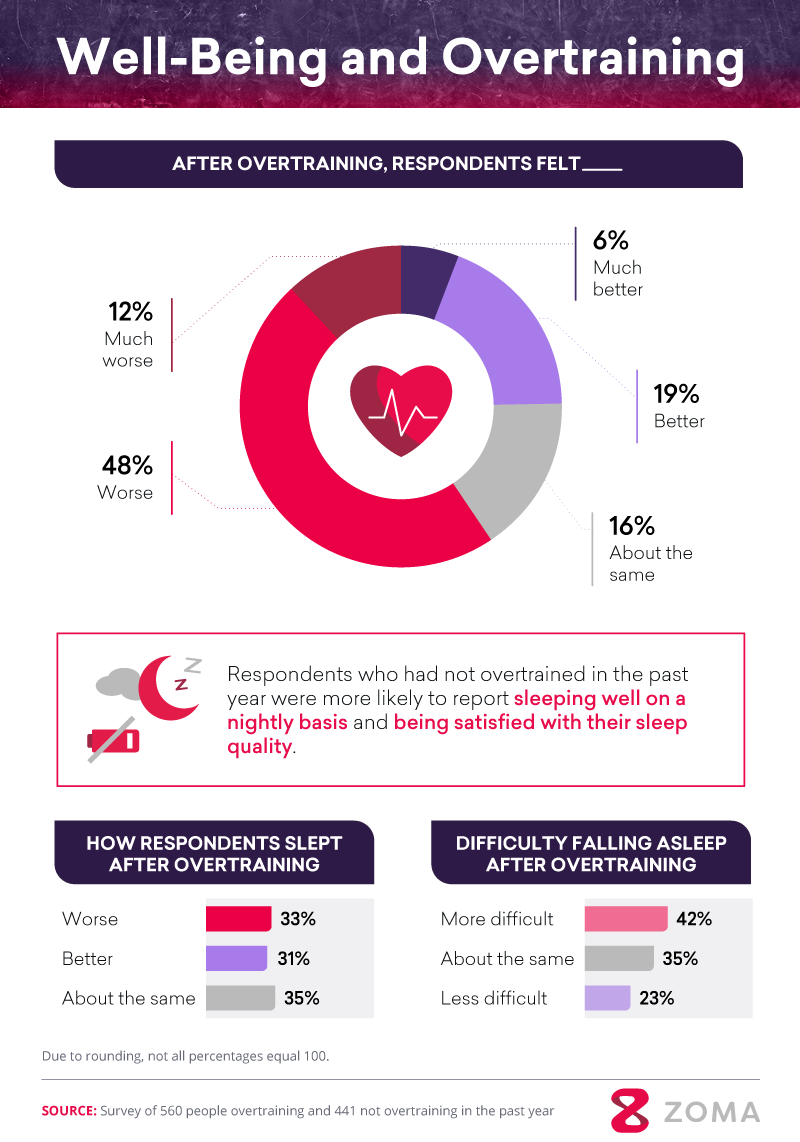Opening Up About Overtraining: Exploring the Impacts of Excessive Exercise
Athletic training often requires months, and sometimes years, of preparation. The human body is incredible at adapting to new circumstances and physical demands—but it also gives clear warning signs when it’s being pushed too hard. However, whether due to a competitive nature or goal in sight, some people ignore these warnings and engage in strenuous exercise, otherwise known as overtraining. We defined “overtraining” as training to the extent that you are unable to recover, or to the point that you experience more harm than good from the work you’re putting in.
So, how does it impact today’s fitness culture? We surveyed over 1,000 people to find out. After separating those who overtrained and those who did not, we discovered what overtraining really means for the body and how it can impact a person’s livelihood. Whether you’re training for a specific event, have considered working with a personal trainer, or are unsure how hard you should push yourself, keep reading to learn more about avoiding overtraining.
Top Overtrainers
We started our mission by surveying athletes in everything from weight lifting to team sports as well as things like cycling and hiking. We asked each of these participants whether or not they had ever overtrained before (which many had) as well as the side effects that they experienced afterwards.

Weightlifters were the most likely to overtrain—37 percent admitted to overtraining. With the use of such heavy equipment, weightlifting poses an immediate safety risk: Lifting too much too fast can cause injury. For example, something as common as the bench press can rupture a pectoral tendon. Pushing yourself too hard, or overtraining, can also cause excessive tissue damage and more serious injuries, which is counterproductive to the goal that 71 percent of weightlifting overtrainers had: Achieve results.
Other athletes weren’t immune to overtraining, either. A third of runners and nearly a quarter of cyclists overtrained for their events. Even swimming, widely regarded as a low-impact exercise, still found 15% of participants experiencing overtraining.
In fact, athletes of all sports suffered the consequences despite their earnest desires: 71 percent faced “serious” consequences, and another 92 percent said the aftermath of overtraining was painful. The irony was painful, too: Wanting to achieve results was the No. 1 reason for overtraining, but results were ultimately worse than what a better training approach would have accomplished.
Facing the Consequences
There were of course, consequences to overtraining, which we explore further here. Athletes and gym-goers detailed the repercussions of pushing their limits and even dove into some of the more emotional impacts of overtraining on the psyche.

Physical incapacity, although temporary, was also common among those who overtrained. Fifty-four percent were incapacitated for at least some time after they pushed themselves too hard. “By overtraining without taking enough rest days, people are actually reducing how many total days they are able to exercise,” says Dr. Bhavik Sheth, Physical Therapist. For an unfortunate 8 percent of those overtraining, physical incapacitation became permanent.
A less jarring but still highly impactful consequence of overtraining was the inability to fulfill normal responsibilities, which happened to 22 percent of respondents. Another 16 percent were bedridden after overtraining, and 8 percent had to miss work.
In terms of the emotional impacts of overtraining, 46 percent of respondents who had overtrained experienced frustration, and almost a third admitted to feeling stress, as well. Apart from being difficult to live through, stress wreaks havoc on an already strained body. According to the Mayo Clinic, stress can be a direct cause of everything from depression and anger to social withdrawal.
Despite these consequences, overtraining injuries proved to be quite common. Even among those who hadn’t overtrained in the past year, a previous injury (44 percent) was more of a reason for precaution than expert advice (20 percent) for why they now took measures not to overtrain. In other words, athletes were more likely to wait until an injury occurred to take precautions against overtraining than they were to take others’ sage advice.
Overtraining and Sleep
Sleeping, another crucial component of training, was also considered. We followed up with athletes who overtrained by asking them how it impacted their dispositions as well as their ability to get some shut-eye.

Although the majority of participants felt worse after overtraining, we would be remiss not to acknowledge the 25 percent who said they felt better or much better afterward. There wasn’t a clear reason why this group felt better, but they were certainly in the minority—60 percent said they felt worse or much worse afterward.
According to respondents, sleep was a key component of training and an unfortunate casualty for many who overtrained, as the impact on sleep was largely negative for overtrainers. Respondents who had not overtrained in the past year were more likely to report sleeping well on a nightly basis. Moreover, a third of respondents started sleeping worse after overtraining, and another 42 percent had a harder time falling asleep.
Sleep, Don’t Overtrain, Repeat
Sleep deprivation, like overexercising, can have enormous physical and psychological impacts. “If you love exercising, then you should also learn to love rest days and sleep so you can continue training without needing to take time off,” says Dr. Bhavik Sheth, Physical Therapist. Without a good night’s rest, you may end up experiencing similar effects to those who did overtrain: stress, accidents, and memory issues. This means that avoiding overtraining is only half the battle; it’s also important to finish your day with much-needed sleep to be your best, most athletic self.
“The effects of pushing your body too hard are eerily similar to the effects of not giving your body enough rest. Listen to warning signs like fatigue and soreness that your body sends to communicate when it’s time to get some sleep or maybe put down the barbells,” said James Nguyen, a sleep expert at Zoma.
At Zoma, we understand how important it is for you to get rest, and we’re here to help. The Zoma Sports Mattress is the ultimate intersection of design and performance, particularly for those who are interested in physical health or athletic training. Using cutting-edge technology, the Zoma Sports Mattress facilitates faster muscle recovery, improved athletic performance, and deeper sleep so you can safely push yourself further and harder every day. Head to Zoma today and start getting the sleep you deserve.
Methodology and Limitations
Using Amazon’s Mechanical Turk service, we surveyed 1,001 people who exercised regularly. Among those 1,001 respondents, 560 had overtrained in the past year, and 441 had not. The number of respondents who engaged in each exercise was as follows: running: 532; weight training: 522; cycling: 283; walking: 221; team sports: 76; hiking: 157; and swimming: 120.
To help ensure respondents took our survey seriously, all respondents were required to identify and correctly answer an attention-check question. In many cases, questions and responses were rephrased for clarity or brevity. These data rely on self-reporting, and statistical testing was not performed on these findings. Potential issues with self-reported data include, but are not limited to, exaggeration, selective memory, and attribution errors on the part of respondents.
Fair Use Statement
Starting to rethink your training regimen to include a little more sleep, or know someone who should? You’re welcome to share the numbers behind this study, but we request that you only share this data for noncommercial purposes, and you link back to the full study on this page.
This article is for informational purposes and should not replace advice from your doctor or other medical professional.
James Nguyen, Sleep Expert 
James Nguyen is Zoma's resident sleep expert and staff writer. James enjoys learning about the newest technologies in the mattress industry and doing deep dives into the science of sleep. He's tried nearly every gadget and gizmo in an effort to determine which sleep-promoting accessories can truly enhance your shut-eye. Outside of work, James takes his dedication to get healthy sleep seriously, and has even declared himself an "expert napper." James' research has been featured on Thrive Global and other media.
View all posts

